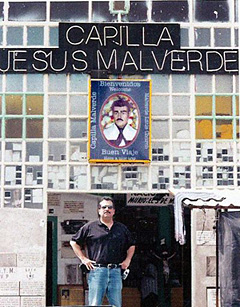 |
 |
 |
 News Around the Republic of Mexico | May 2007 News Around the Republic of Mexico | May 2007  
Mexican Robin Hood: Unofficial Saint Attracts Smugglers, Poor, Trendy
 David Agren - Catholic News Service David Agren - Catholic News Service


| | The Jesus Malverde shrine in Culiacan, Mexico. |
Culiacan, Mexico - Miguel Angel Salazar and his brother grow beans and corn on a 12-acre farm outside Culiacan, the prosperous capital of the western agricultural state of Sinaloa. Aside from reaping a bumper crop four years ago, their beans failed to fetch a worthwhile price.

So the brothers and their families visited the Jesus Malverde shrine, where they asked the unofficial saint for help. A short time later, they sold their crop for a better-than-expected price. In the years afterward, both their harvests and the prices received remained robust.

Like many in Culiacan - and increasingly in other parts of Mexico, too - Salazar attributes miracles and blessings to Malverde, a controversial figure known as the patron saint of narcotics trafficking, but someone the Catholic Church does not recognize.

Followers call Malverde the Robin Hood of Mexico, a mustachioed bandit from the rugged hills of Sinaloa who reputedly stole from the rich and gave to the poor.

Narcotics traffickers claim him as their own and donate heavily to maintain Malverde's shrine, which is across from a McDonald's and near the state legislature in Culiacan, the hub of an area infamous for smuggling activities. Their donations also underwrite celebrations at the shrine every May 3, the anniversary of Malverde's hanging in 1909.

At the celebration, the traffickers reputedly hire bands that play "narcocorridos," songs glorifying smuggling-related exploits, and the poor receive free food and household items. Throughout the year, donations fund charity projects, such as paying for the funeral costs for those lacking the resources.

A steady stream of visitors converges on the shrine every year, and most tourist maps provide directions. Many visitors leave Polaroid photos with pithy notes giving thanks to Malverde, and sometimes also to Our Lady of Guadalupe and St. Jude.

Others pay for permanent plaques, which speak of "favors received" and in some cases "success in business." The majority of visitors, according to vendors and musicians working at the shrine, are poor.

"All sorts of people come here ... famous people, important people, poor people (and) rich people," said Dona Tere, an elderly woman, hawking Malverde busts at the shrine.

She disputes Malverde's reputation as an icon for only narcotics traffickers, saying he's beloved by the poor. But others in Culiacan hold less favorable views; they include taxi driver Juan Bustamante, who called Malverde "a scoundrel."

Infamy aside, Malverde's legend is spreading.

A family in Mexico City's tough Doctores neighborhood attributed a miracle to the bandit and erected a Malverde shrine, which includes the folkloric Santa Muerte, or Saint Death, figure.

Over in the chic Condesa district, a bar called Malverde attracts the monied set with $7 martinis and an atmosphere inspired by the tacky side of Mexican pop culture, including several Malverde busts.

"This place isn't about glorifying narcos," bartender Luis Mondragon said somewhat defensively.

Arturo Navarro Ramos, a professor at ITESO, a Guadalajara-area Jesuit university, said that in general "Jesus Malverde's followers are marginalized people," pointing to narcotics traffickers as prime examples.

"He facilitates the view that people can be saved while not giving up their improper activities," said Navarro.

Due to the sketchy accounts of Malverde's life - even details of his death are disputed -Navarro said Malverde will never be recognized as an official saint.

Little of that seems important to Salazar, who said of Malverde, "A lot of people have faith in him.

"There have been a lot of miracles," he added. | 
 | |
 |



